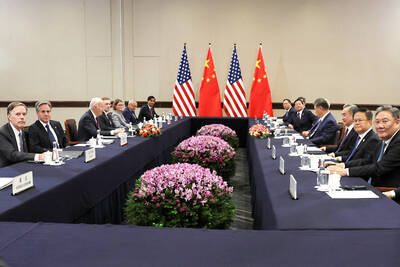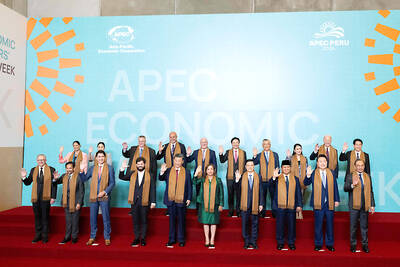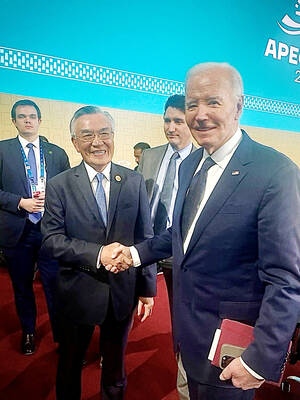The world tourism body said yesterday that it expects tourism in Asia to bounce back by the end of the year despite being battered by SARS fears, the Iraq war and last year's Bali bombings.
"We expect the second part of the year to be positive and tourism will be back on track in the fourth quarter," World Tourism Organization (WTO) Secretary-General Francesco Frangialli said in an interview.

PHOTO: REUTERS
He was in Manila to attend a five-day WTO meeting of more than 100 delegates and tourism officials from at least 18 countries in the region.
Fears of catching SARS during travel caused a 30 percent to 40 percent drop in reservations in the region this year, compared with last year, even damaging tourism industries in countries in the region that had no cases of local transmission.
But Frangialli noted that the World Health Organization has declared the disease on the wane.
He said Asia's tourism started to recover after the end of the Iraq war, but that the rebound was delayed by the SARS outbreak.
"But the recovery will be taking place before the end of the year," Frangialli said.
Asia saw an 8.3 percent jump in tourist arrivals last year compared with 2001, despite the continuing effects of the Sept. 11 terrorist attacks, last October's Bali bombings and the region's lackluster economic performance, Frangialli said.
He declined to provide figures on the tourism recovery, citing a lack of data. One of the objectives of the WTO conference is to come up with a set of indicators to measure the economic impact of tourism.
Frangialli said the indicators would allow officials to assess the crisis suffered by the industry over the past two years, make good forecasts and see how tourism can help create jobs and contribute to economies.
Last month, the International Air Transport Association said it expects a loss of US$10 billion this year due to SARS, the lingering effects of the Sept. 11 attacks and the Iraq war.
The UN-affiliated WTO has 141 member states and seven territories as associate members.

ONE LAST TALK: While Xi said that Taiwan was a ‘red line,’ Biden, in what is likely his last meeting with Xi as president, called for an end to China’s military activity around Taiwan China’s military intimidation and economic coercion against Taiwan are the main causes of tensions that are destabilizing peace in the Taiwan Strait, Taipei said yesterday while thanking US President Joe Biden for expressing Washington’s firm stance of maintaining peace and stability in the region. Biden and Chinese President Xi Jinping (習近平) met on Saturday for their third meeting and their first talks in seven months on the sidelines of the APEC forum in Lima, Peru. It was likely Biden’s last meeting as president with Xi. During their conversation, Biden reiterated the US’ opposition to any unilateral change to the “status quo” from either

Taiwan would participate in the 2026 APEC summit to be hosted by China after Beijing promised it would ensure the personal safety of attendees, Taiwanese national security sources said yesterday. The APEC Leaders’ Machu Picchu Declaration announced yesterday said that China would host the APEC summit in 2026. Beijing proposed hosting the summit shortly before this year’s gathering began on Friday, a national security official said, speaking on condition of anonymity. Many APEC members expressed concerns about China hosting the event and said that prior communication over the decision was insufficient, the official said. Taiwan brought up concerns about legal “guidelines” China announced in

SUPPORT: Arms sales to NATO Plus countries such as Japan, South Korea and Israel only have to be approved by the US Congress if they exceed US$25m The US should amend a law to add Taiwan to the list of “NATO Plus” allies and streamline future arms sales, a US commission said on Tuesday in its annual report to the US Congress. The recommendation was made in the annual report by the US-China Economic and Security Review Commission (USCC), which contained chapters on US-China economic and trade ties, security relations, and Taiwan and Hong Kong. In the chapter on Taiwan, the commission urged the US Congress to “amend the Arms Export Control Act of 1976 to include Taiwan on the list of ‘NATO Plus’ recipients,” referring to

MEET AND GREET: The White House, which called the interaction ‘just a handshake,’ did not immediately respond to a request for comment on whether Biden planned to visit Taiwan’s envoy to the APEC summit, Lin Hsin-i (林信義), on Friday invited US President Joe Biden to visit Taiwan. During the APEC Leaders’ Informal Dialogue, Lin, who represented President William Lai (賴清德) at the summit, spoke with Biden and expressed gratitude to the outgoing US president for his contribution to improving bilateral ties between Taipei and Washington over the past four years, the Ministry of Foreign Affairs said. Lin and Biden exchanged views during the conversation, with Lin extending an invitation to Biden to visit Taiwan, it said. Biden is to step down in January next year, when US president-elect Donald Trump is